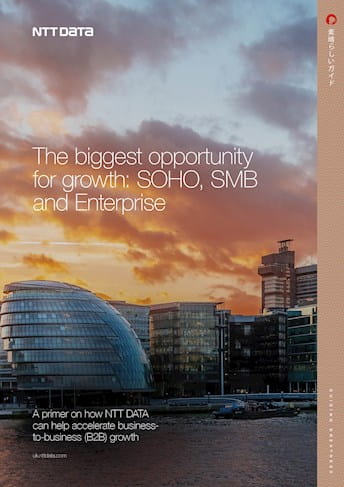B2B is the place to be
We live in a digital world. Our daily activities at home, work and on the move are now constantly, effortlessly, seamlessly digital. We no longer “go” online, because we are online, always connected. This digital world is good for telcos who, after all, provide the fundamental connectivity that makes digital possible. Yet it has also changed the game, as over-the-top players use digital innovation to encroach on telco business, resulting in traditional telco revenue flattening and falling as connectivity becomes a true commodity.In response, telcos everywhere eye up the B2B market as their best hope to catalyse growth. With 5G coming on stream and the Internet of Things (IoT) maturing, there is a new momentum to the digital B2B market. Growth opportunities for telcos are waiting to be won.
‘Most telcos know about the B2B opportunity, including its inherent challenges, but are having a hard time operationalising it.’
Overcoming challenges to boost growth in B2B
Forward-looking telcos already have a focus on digital B2B growth, using a customer-led approach to build compelling products for B2B customers. Even so, they face significant challenges, such as an increasingly diverse B2B environment. Buyers and their procurement processes in different business customer segments, ranging from retail to transport and construction to financial services, have very different demands. Distinct approaches are needed to address each successfully.
Selling digital is also hugely complex and competitive. With 5G, technology intricacy is rocketing, which will further stress telcos’ ability to deliver new digital B2B products. IoT involves a vast range of technologies that are difficult to package into a single offer.
NTT DATA believes that telcos hoping to succeed in the B2B market will need to support those customers by going beyond connectivity services to develop IoT consultancy and management offers.
A rich partner ecosystem is also essential. IoT is a good example of why. Only a very small proportion of IoT revenue can be won solely from the data pipes. Likewise, security has huge business potential, yet a typical telco will not realistically and rapidly be able to develop the required products by itself.
In this document, NTT DATA highlights how it can help ambitious telcos to further develop and operationalise their growth strategy for the burgeoning digital B2B market.
A dedicated business advisor for stores with high SOHO traffic can boost sales by more than 300%.
An enterprise is not a SOHO, which is not an SMB
The buying behaviour and demands of an enterprise are very different from that of a Small office/Home office (SOHO).
The needs of the SOHO
SOHO customers have typically fewer than ten people and are often owner-run. They don’t have IT expertise so they rely on good advice when buying mobile and broadband services. They prefer face- to-face engagement, which means going into their local mobile phone retail outlet. They are often ready to buy; they simply want to know they are getting the right product for their business.
That may sound similar to consumers, yet the needs of SOHOs are different. This means store staff must be trained to speak with small businesses and SOHO products must be available. The buying experience is paramount. Getting it right wins the sale and creates an ongoing local relationship leading to new service sales, upgrades and renewals. This drives the lifetime value of SOHO customers.
In NTT DATA’s experience, simply investing in a dedicated business advisor for stores with high SOHO traffic can boost sales by more than 300%.
The needs of the SMB
A Small- to Medium-sized Business (SMB), typically employs 11 to 250 people. SMBs can be too small to offer dedicated sales and support but are too large and diverse to offer standard generic products. Likewise, pushing consumer or enterprise products onto SMBs won’t work. Scaled-up consumer products do not have the scope or operational processes to support SMBs. Scaled-down enterprise products are typically too expensive and complex for SMBs.
Understanding the SMB market through segmentation is essential. However, segmenting by number of employees does not address the SMB’s needs. For example, construction companies are highly mobile and have little need for a fixed office. Retailers have little need for mobility, but a fixed retail store is very important for revenue generation.
It is quite likely that the base products are similar to consumer or enterprise products. However, specific SMB requirements must be built into the propositions, such as the ability to self-administer changes in real time with simple administration functions.
The needs of the Enterprise
Enterprises have 251 or more people and call for a different engagement than small businesses.
Typically, telco sales teams have been set up to offer products or narrow bundles of services.
Sales cycles tend to be short and personnel are used to dealing with large numbers of small customers. This has led to a loss of opportunity in the enterprise market for many telcos with nearly 40% of the 250 enterprises surveyed by BearingPoint highlighting challenges around innovation and the relevance of solutions when they had worked with telcos in the past.
5G and IoT will be critical enablers of enterprise business growth for telcos. Sales, product development and service functions need to evolve to provide integrated solutions, typically as packages with integrated services. Timescales are also much longer, with in-depth procurement processes to be negotiated to achieve an enterprise partnership deal.

Whitepaper - 10 min read
The biggest opportunity for growth
A primer on how NTT DATA can help accelerate business-to-business (B2B) growth
Download Whitepaper